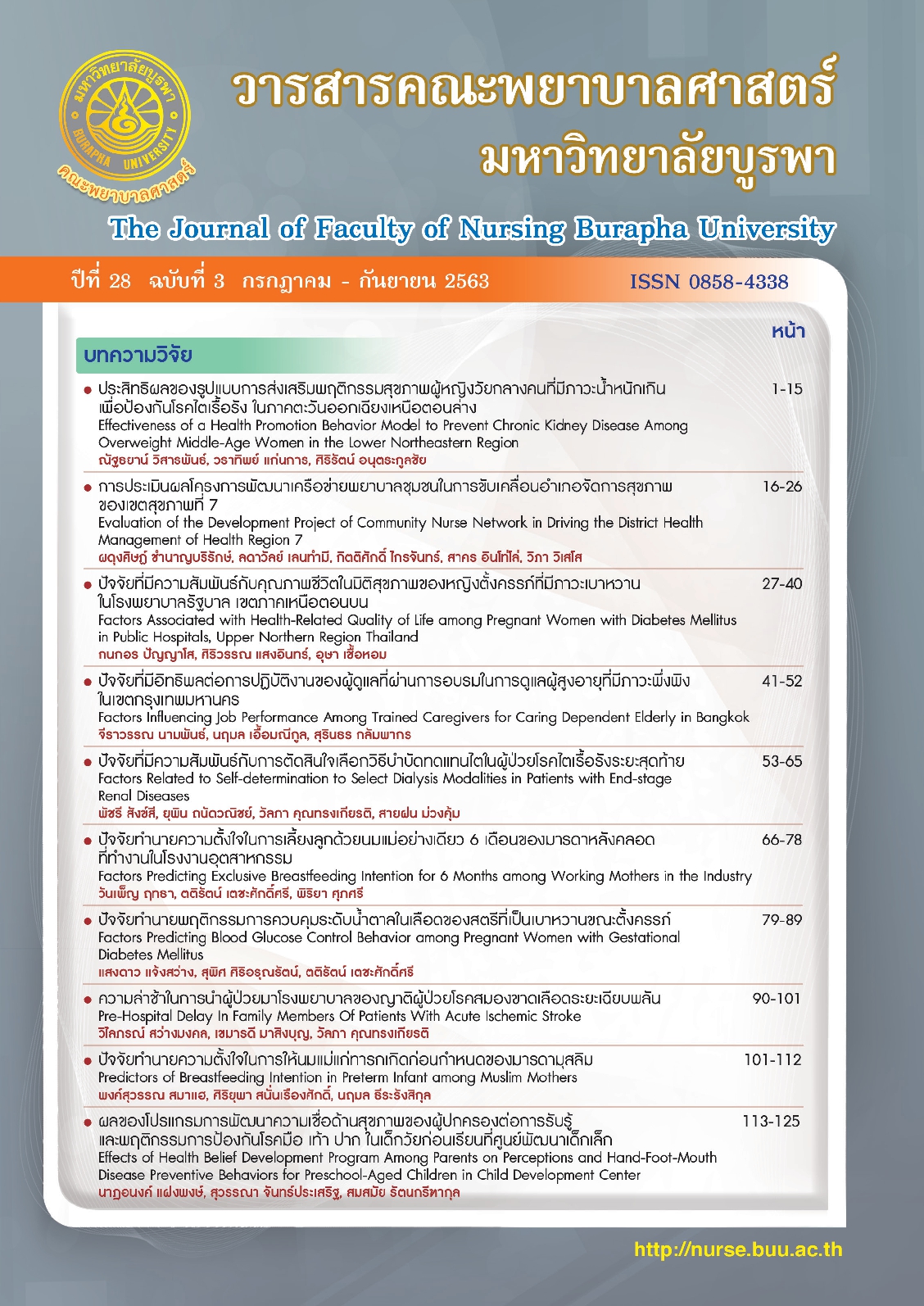ปัจจัยที่มีความสัมพันธ์กับการตัดสินใจเลือกวิธีบำบัดทดแทนไต ในผู้ป่วยโรคไตเรื้อรังระยะสุดท้าย
คำสำคัญ:
ความหวัง, ความชอบ, ทัศนคติ, ความสามารถในการเข้ารับบริการ, การตัดสินใจ, ผู้ป่วยโรคไตเรื้อรัง ระยะสุดท้ายบทคัดย่อ
บทคัดย่อ
ผู้ป่วยโรคไตเรื้อรังระยะสุดท้ายที่ไม่สามารถตัดสินใจเลือกวิธีบำบัดทดแทนไตที่เหมาะสมกับบริบทของตนเองได้ ทำให้มีความไม่ต่อเนื่องในการรักษา การศึกษาครั้งนี้เป็นแบบเชิงพรรณนาหาความสัมพันธ์ มีวัตถุประสงค์เพื่อศึกษาปัจจัยที่มีความสัมพันธ์กับการตัดสินใจเลือกวิธีบำบัดทดแทนไตของผู้ป่วยโรคไตเรื้อรังระยะสุดท้าย กลุ่มตัวอย่างเป็นผู้ป่วยที่ได้รับการวินิจฉัยจากอายุรแพทย์โรคไตว่าเป็นโรคไตเรื้อรังระยะสุดท้ายและจำเป็นต้องรักษาด้วยการบำบัดทดแทนไต จำนวน 82 ราย คัดเลือกโดยวิธีการสุ่มอย่างง่าย เครื่องมือที่ใช้เก็บรวบรวมข้อมูล ประกอบด้วย แบบบันทึกข้อมูลส่วนบุคคล แบบประเมินความหวังต่อการบำบัดทดแทนไต แบบประเมินความชอบต่อวิธีบำบัดทดแทนไต แบบประเมินความสามารถในการเข้ารับบริการบำบัดทดแทนไต แบบประเมินทัศนคติของผู้ป่วยต่อการบำบัดทดแทนไต และแบบประเมินการตัดสินใจเลือกวิธีบำบัดทดแทนไต วิเคราะห์ข้อมูลด้วยสถิติเชิงพรรณนา และสัมประสิทธิ์สหสัมพันธ์ของเพียร์สัน
ผลการวิจัยพบว่า กลุ่มตัวอย่างผู้ป่วยโรคไตเรื้อรังระยะสุดท้ายมีการตัดสินใจเลือกวิธีบำบัดทดแทนไต
อยู่ระดับสูง ( = 40.59, SD = 2.02) และพบว่า ความหวังต่อการบำบัดทดแทนไต ความชอบต่อวิธีบำบัดทดแทนไตและความสามารถในการเข้ารับบริการบำบัดทดแทนไตมีความสัมพันธ์กับการตัดสินใจเลือกวิธีบำบัดทดแทนไตอย่างมีนัยสำคัญทางสถิติ (r = .32, r = .29, r = .34, p < .01) ส่วนทัศนคติของผู้ป่วยต่อการบำบัดทดแทนไตไม่มีความสัมพันธ์กับการตัดสินใจเลือกวิธีบำบัดทดแทนไต (r = -.01, p > .05)
ผู้ป่วยโรคไตเรื้อรังระยะสุดท้ายมีความสามารถในการตัดสินใจเลือกวิธีบำบัดทดแทนไตด้วยตนเอง พยาบาลวิชาชีพและบุคลากรด้านสุขภาพควรมีการสนับสนุนความรู้เกี่ยวกับการเจ็บป่วยและวิธีบำบัดทดแทนไตเพื่อให้ผู้ป่วยเกิดความเข้าใจ มีทัศนคติที่ดี และมีความชอบต่อวิธีบำบัดทดแทนไตที่ตนเองเลือก และสุดท้าย
ต้องส่งเสริมให้ผู้ป่วยมีความหวังในการดำเนินชีวิตแม้ว่าต้องเข้ารับการรักษาด้วยวิธีบำบัดทดแทนไต
เอกสารอ้างอิง
patients: Do anxiety, stress and depression matter. Biomed Central Nephrology, 19(98),
1-6.
Brislin, R. (1986). Field methods in cross-cultural psychology. In W. J. Lonner & J. W. Berry (Eds.),
The Wording and Translation of Research Instruments. Newbury park, CA: Sage
publications.
Cassidy, B. P., Harwood, L., Getchell, L. E., Smith, M., Sibbald, S. L., & Moist, L. M. (2018).
Educational support around dialysis modality decision making in patients with chronic
kidney disease: A qualitative study. Canadian Journal of Kidney Health and Disease,
5, 1-9.
Chaisawat, P., Pawananan, P., Nanongkai, S., & Kittipichai, V. (2016). Utilization of elderly health
services, tambon viharn khao, amphor tha-chang, Singburi. Vajira Nursing Journal, 18(2),
42-50. [In Thai]
Chang, P.Y., Chien, L.N, Lin, Y.F, Wu, M.S, Chiu, W.T, & Chiou, H.Y. (2016). Risk factors of gender
for renal progression in patients with early chronic kidney disease. Medicine, 95(30), 1-7.
Chylinska, J., Lazarewicz, M. A., Rzadkiewicz, M., Adamus, M., Jaworski, M., Haugan, G., &
Wlodarczyk, D. (2017). The role of gender in the active attitude toward treatment and
sociodemographic factors as moderators. Biomed Central Geriatrics, 17(284), 1-10.
Fresenius Medical Care. (2013). Annual report 2013. Retrieved Aprill 1, 2019,
from https://www.freseniusmedicalcare.com/fileadmin/data/de/pdf/investors/News Publications/Annual_Reports/2013/FMC_Annual_Report_2013_en.pdf.
Faul, F., Erdfelder, E., Lang, G. A., & Buchner, A. (2007). G*power: A flexible statistical power
analysis program for the social, behavioral, and biomedical sciences. Behavior Research Methods, 39(2), 175-191.
He, F., Li, D., Cao, R., Zeng, J., & Guan, H. (2014). The attitude-behavior discrepancy in medical
decision making. Iranian Red Crescent Medical Journal, 16(12), e14612. https://doi.org/10.5812/ircmj.14612.
Hyodo, T., Fukagawa, M., Hirawa, N., Hayashi, M., Nitta, K., Chan, S., & Widiana, G. (2019). Present
status of renal replacement therapy in Asian countries as of 2016: Cambodia, Laos, Mongolia, Bhutan, and Indonesia. Renal Replacement Therapy, 5(12), 1-11.
Kochasenee, P., & Jittinan, A. (2019). Chornic kidney disease and initiation of dialysis.
Essentials in hemodialysis. Bangkok: Text and journal publication. [In Thai]
Kramer, A., Pippias, M., Noordzij, M., Stel, V. S., Andrusev, A. M., Aparicio-Madre, M. I., & Jager,
K. J. (2019). The european renal association – european dialysis and transplant association (era-edta) registry annual report 2016: A summary. Clinical Kidney Journal, 11(1), 1-19.
Lazarewicz, M. A., Wlodarczyk, D., Chylinska, J., Jaworski, M., Rzadkiewicz, M.,
Adamus, M., & Espnes, G. A. (2018). Testing a new tool assessing attitude towards treatment and health in primary health care setting: senior patients and doctors
perspectives. Scandinavian Journal of Public Health, 47(1), 1-9.
Ladin, K., Pandya, R., Perrone, R. D., Meyer, K. B., Kannam, A., Loke, R., Oskoui, T., Weiner,
D. E., & Wong, J. B. (2018). Characterizing approaches to dialysis decision making
with older adults: A qualitative study of nephrologists. Clinical Journal of The
American Society of Nephrology : CJASN, 13(8), 1188–1196.
Lee, A., Gudex, C., Povlsen, J. V., Bonnevie, B., & Nielsen, C. P. (2008). Patients' views regarding choice of dialysis modality. Nephrology Dialysis Transplantation, 23(12), 3953–3959.
Lertlulm, L. (1999). Hope of elderly. Graduate school. Khon Kaen University. [In Thai]
Lindberg, J., Johansson, M., & Broström, L. (2019). Temporising and respect for patient self-
determination. Journal of Medical Ethics, 45(3), 161–167.
Lorcy, N., Turmel, V., Oger, E., Couchoud, C., & Vigneau, C. (2015). Opinion of french
nephrologists on renal replacement therapy: survey on their personal choice.
Clinical Kidney Journal, 8(6), 785-788.
Miller, J.F. (1985). “Hope”. American Journal of Nursing, 85, 23-25.
Penchansky, R., & Thomas, J. W. (1981) The concept of access definition and relationships to
consumer satisfaction. Medical Care, 19, 127-140.
Polit, D.F., & Beck, C.T. (2004) Nursing research: Principles and methods. (7th Ed.), Lippincott
Williams & Wilkins, Philadelphia.
Polit, D.F., & Beck, C.T. (2017) Nursing research: generating and assessing evidence for nursing
practice (10th Ed.), Philadelphia: Wolters Kluwer Health.
Qazi, H. A., Chen, H., & Zhu, M. (2018). Factors influencing dialysis withdrawal: a scoping review.
Biomed Central Nephrology, 19(96), 3-11.
Russell, J. S., & Boulware, E. L. (2018). End-stage renal disease treatment options education.
Seminar in Dialysis, 31, 122-128.
Ryan, R. M., & Deci, E. L. (2017). Self-determination theory basic psychological needs in
motivation, development, and wellness. New York: The Guilford Press.
Saeed, F., Muhammad, S., Khalid, R., Raza, N., Ronald, E., Sarah, D., Muhammad, M., & Kevin, F.
(2020). Dialysis decision-making and preferences for end-of-life care: perspectives of pakistani patients receiving maintenance dialysis. Journal of Pain and Symptom Management, 59(3), 1-8.
Saran, R., Robinson, B., Abbott, K. C., Agodoa, L., Bragg-Gresham, J., Balkrishnan, R., ... Shahinian,
V. (2019). Us renal data system 2018 annual data report: Epidemiology of kidney disease in the united states. American Journal of Kidney Diseases, 73(3), 1-772.
Shafi, S. T., Saleem, M., Anjum, R., Abdullah, W., & Shafi, T. (2018). Refusal of hemodialysis by
hospitalized chronic kidney disease patients in Pakistan. Saudi Journal of Kidney Diseases
and Transplantation, 29(2), 401–408.
Sidani, S., Epstein, D. R., Fox, M., & Miranda, J. (2018). Psychometric properties of the treatment
perception and preferences measure. Clinical Nursing Research, 27(6), 743-761
Song, M.K., Lin, F.C., Gilet, C. A., Arnold, R. M., Bridgman, J. C., & Ward, S. E. (2013).
Patient perspectives on informed decision-making surrounding dialysis initiation. Nephrol Dial Transplant, 28, 2815–2823.
Winterbottom, A., Bekker, H. L., Conner, M., & Mooney, A. (2012). Choosing dialysis modality:
decision making in a chronic illness context. Health Expectations, 17, 710-723.
Yazawa, M., Omae, K., Shibagaki, Y., Inaba, M., Tsuruya, K., & Kurita, N. (2019). The effect of transportation modality to dialysis facilities on health related quality of life among hemodialysis patients: results from the Japanese dialysis outcomes and practice pattern study. Clinical Kidney Journal, 110, 1-7.





